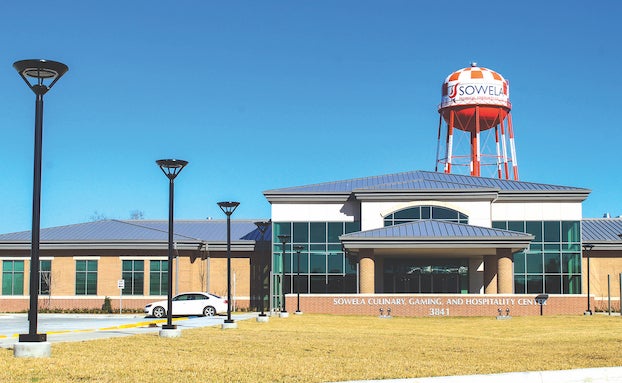Area women launch nonprofit to foster inherent inclusivity in play spaces, businesses and restaurants
Published 11:36 am Sunday, January 14, 2024

- Families for Inclusion founders Julia Bourgeois, left, and Deveni Polito said they were inspired by their children to make a community that accepts them and allows them to participate in daily activities “like everyone else.” (Special to the American Press)
Families for Inclusion, a nonprofit in Southwest Louisiana, is on a mission to enhance inclusivity and accessibility for individuals with special needs.
“We were inspired by our children — Brooks and Gia — to make a community that accepts them and allows them to participate in daily activities like everyone else,” said Julia Bourgeois, who founded the organization in 2022 with Deveni Polito. “They really pushed us to start this group.”
Bourgeois said Families for Inclusion fights for the rights of individuals with special needs, utilizing advocacy, education and community engagement as key tools. Their goal is to foster “inherent inclusivity” in play spaces, businesses and restaurants.
“Our vision extends beyond the conventional boundaries, aiming to create a society where everyone — regardless of abilities — can actively engage in all aspects of life,” said Jordan Steelman, who joined the group in honor of her late son, Luke. “No matter where you are, no matter what you’re doing it needs to be inclusive and our goal and our mission is for it to become so inclusive that we don’t really think about it. We want to create a world where accessibility and inclusion is just normal, it’s not even a thought where we have to even make it a thing.”
Steelman said inclusion should always be in the forefront of conversations when it comes to new construction and renovations.
“We want to get to where we can go somewhere and give our input on how things should be set up, how to really engage the inclusivity and the accessibility,” Steelman said. “ADA (Americans with Disabilities Act) requirements don’t always make things inclusive and we want to work with groups and businesses on how they can make their facilities inclusive to all needs.”
Bourgeois — whose son has Spina Bifida — said their group met with the designers of Lake Area Adventures on Country Club Road during the design phase of the entertainment facility and from those discussions a quiet room for children with sensory overload was created as well as a sensory room with engaging wall activities.
“That room is for children who want to be stimulated or for children on wheels who can’t participate in the bounce houses,” Bourgeois said.
She said accessibility is not the same as inclusivity.
“Accessibility refers to the design of the product, but inclusivity extends beyond access; it’s a sense of belonging,” Bourgeois said. “You would be able to go to a place and be actively welcome. For special needs, ensuring accessibility might involve physical accommodations while inclusivity would involve an environment where those with special needs feel accepted and supported without experiencing barriers or discrimination.”
Steelman said an ADA-compliant ramp allows someone with a wheelchair or walker to get in a building, but there must be something inside that building that makes them feel included.
“That’s the point we’re trying to drive home,” she said.
Bourgeois said the group is working with the city of Lake Charles on the Lock Park rebuild, something that is being paid for through the recently passed LC Rebound package, as well as an inclusive playground design for Port Wonder, under construction on the lakefront.
“There are some parks in the area that have wheelchair swings but what Julia has experienced with Brooks is there is also mulch,” Steelman said. “Yes, there is a ramp but once you get into the park you can’t go anywhere on wheels with the mulch.”
The organization is also launching two grants this year to further underscore their commitment to supporting individuals with special needs.
“The Luke’s Legacy Grant is very important to me,” Steelman said. “Luke was my child and was born with Trisomy 18, which is a chromosome disorder.”
Luke lived for 12 hours before passing away.
“He would have needed a wheelchair, he would have needed a trach, he would have needed all the medical accessibility and that’s why it is so important to me to be involved with Families for Inclusion because I would like to advocate for the children that don’t come home,” Steelman said.
She said the Luke’s Legacy Grant is being offered to families who having mounting medical bills or travel expenses for appointments
with specialists outside the area. It can also be used for home renovations, such
as widening doorways and halls to accommodate a wheelchair or redesigning a bathroom for those with special needs.
“The Luke’s Legacy Grant will give $1,500 to a family and it will launch on Feb. 12, which was Luke’s birthday,” she said. Families can start applying for the grant online on Feb. 12 at www.ffi-swla.com.
The group is also launching the B&G Hope Grant, which will be awarded to a local therapist for continuing education needs.
“So many of these children that we see and people that we see need speech therapists, they need occupational therapy, they need physical therapy, they need all of these different therapists and what we’re finding is that our families are having to travel,” Steelman said. “Not so much is offered in Southwest Louisiana, especially when you need the extensive therapy that these people are needing. Why can’t we offer that in Southwest Louisiana? The B&G Hope Grant is for a therapist who will receive $3,200 so that they can further their education and become certified in those types of therapy so those treatments can be offered here.”
Bourgeois said the organization envisions a future where diversity is celebrated, ensuring no one is left behind.
“Families for Inclusion stands as a driving force for positive change, transforming Southwest Louisiana into a more accessible and inclusive community that values the unique contributions of every individual,” she said. “Every day I go somewhere and I think, ‘How would my son Brooks, when he’s older, open this door? How would he wheel himself him? How would he do this independently?’ ”
She said that’s what drives Families for Inclusion.
“We are not just focused on children, we just happen to have young children right now,” Bourgeois said. “Think about elderly people who end up in a wheelchair, think about someone who gets in a car accident and now they have special needs. Think about someone who falls and breaks their leg and may need a brace or a wheelchair for a few weeks. If you make things accessible from the beginning, they’re accessible to everybody.”
a
Online: www.ffi-swla.com.





